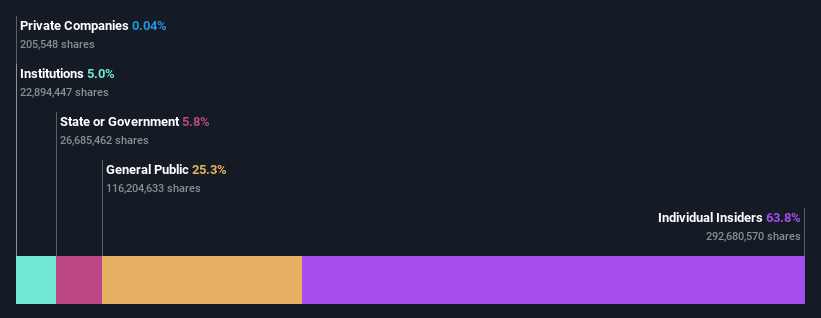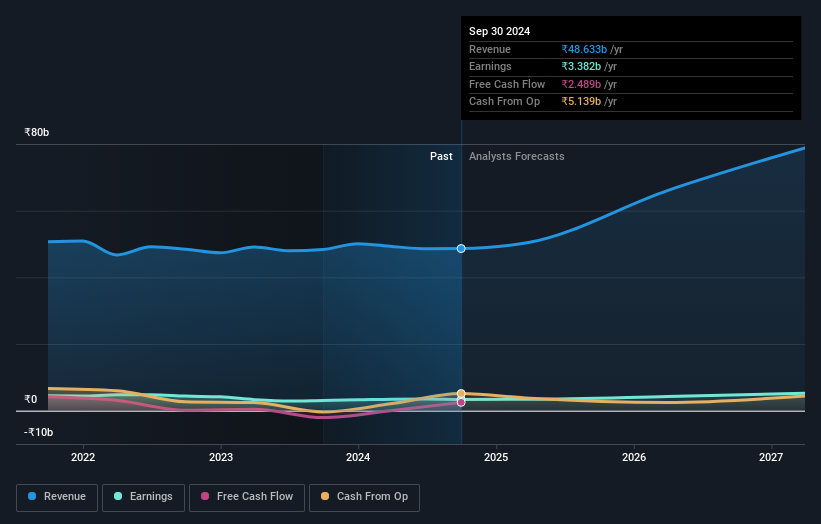Insiders of Gujarat Ambuja Exports Limited (NSE:GAEL) have had a great week after last week's ₹6.7b gain and they haven't stopped buying

Key Insights
- Gujarat Ambuja Exports' significant insider ownership suggests inherent interests in company's expansion
- 62% of the company is held by a single shareholder (Manish Gupta)
- Insiders have been buying lately
A look at the shareholders of Gujarat Ambuja Exports Limited (NSE:GAEL) can tell us which group is most powerful. With 64% stake, individual insiders possess the maximum shares in the company. In other words, the group stands to gain the most (or lose the most) from their investment into the company.
Having purchased shares recently, insiders must be glad after market cap hit ₹64b last week.
Let's delve deeper into each type of owner of Gujarat Ambuja Exports, beginning with the chart below.
View our latest analysis for Gujarat Ambuja Exports

What Does The Institutional Ownership Tell Us About Gujarat Ambuja Exports?
Institutional investors commonly compare their own returns to the returns of a commonly followed index. So they generally do consider buying larger companies that are included in the relevant benchmark index.
Since institutions own only a small portion of Gujarat Ambuja Exports, many may not have spent much time considering the stock. But it's clear that some have; and they liked it enough to buy in. If the business gets stronger from here, we could see a situation where more institutions are keen to buy. When multiple institutional investors want to buy shares, we often see a rising share price. The past revenue trajectory (shown below) can be an indication of future growth, but there are no guarantees.

Hedge funds don't have many shares in Gujarat Ambuja Exports. Looking at our data, we can see that the largest shareholder is the CEO Manish Gupta with 62% of shares outstanding. This essentially means that they have significant control over the outcome or future of the company, which is why insider ownership is usually looked upon favourably by prospective buyers. Investor Education and Protection Fund (IEPF) is the second largest shareholder owning 5.8% of common stock, and Sulochana Gupta holds about 2.2% of the company stock. Interestingly, the third-largest shareholder, Sulochana Gupta is also a Member of the Board of Directors, again, indicating strong insider ownership amongst the company's top shareholders.
Researching institutional ownership is a good way to gauge and filter a stock's expected performance. The same can be achieved by studying analyst sentiments. There is a little analyst coverage of the stock, but not much. So there is room for it to gain more coverage.
Insider Ownership Of Gujarat Ambuja Exports
While the precise definition of an insider can be subjective, almost everyone considers board members to be insiders. Company management run the business, but the CEO will answer to the board, even if he or she is a member of it.
I generally consider insider ownership to be a good thing. However, on some occasions it makes it more difficult for other shareholders to hold the board accountable for decisions.
Our most recent data indicates that insiders own the majority of Gujarat Ambuja Exports Limited. This means they can collectively make decisions for the company. So they have a ₹41b stake in this ₹64b business. Most would argue this is a positive, showing strong alignment with shareholders. You can click here to see if those insiders have been buying or selling.
General Public Ownership
The general public-- including retail investors -- own 25% stake in the company, and hence can't easily be ignored. While this size of ownership may not be enough to sway a policy decision in their favour, they can still make a collective impact on company policies.
Next Steps:
It's always worth thinking about the different groups who own shares in a company. But to understand Gujarat Ambuja Exports better, we need to consider many other factors. For instance, we've identified 1 warning sign for Gujarat Ambuja Exports that you should be aware of.
Ultimately the future is most important. You can access this free report on analyst forecasts for the company.
NB: Figures in this article are calculated using data from the last twelve months, which refer to the 12-month period ending on the last date of the month the financial statement is dated. This may not be consistent with full year annual report figures.
New: Manage All Your Stock Portfolios in One Place
We've created the ultimate portfolio companion for stock investors, and it's free.
• Connect an unlimited number of Portfolios and see your total in one currency
• Be alerted to new Warning Signs or Risks via email or mobile
• Track the Fair Value of your stocks
Have feedback on this article? Concerned about the content? Get in touch with us directly. Alternatively, email editorial-team (at) simplywallst.com.
This article by Simply Wall St is general in nature. We provide commentary based on historical data and analyst forecasts only using an unbiased methodology and our articles are not intended to be financial advice. It does not constitute a recommendation to buy or sell any stock, and does not take account of your objectives, or your financial situation. We aim to bring you long-term focused analysis driven by fundamental data. Note that our analysis may not factor in the latest price-sensitive company announcements or qualitative material. Simply Wall St has no position in any stocks mentioned.
About NSEI:GAEL
Gujarat Ambuja Exports
Primarily engages in the agro processing activities in India and internationally.
Flawless balance sheet established dividend payer.
Similar Companies
Market Insights
Community Narratives




